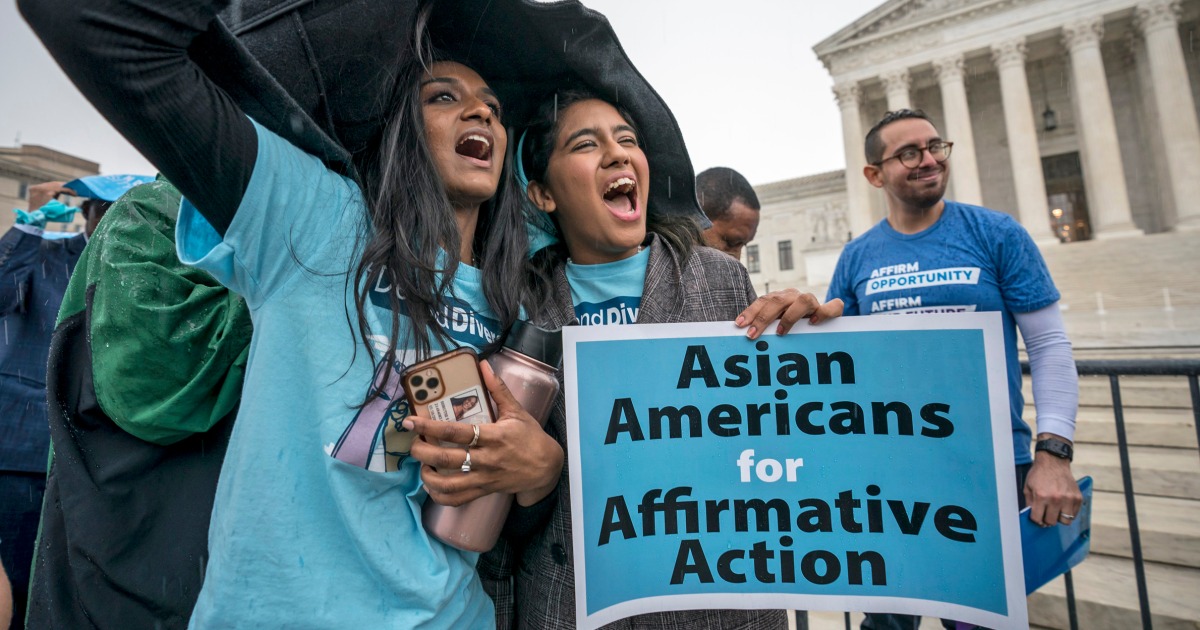
As the Supreme Court begins deliberating the future of affirmative action, a growing coalition of Asian American students is trying to get across a message. While a small faction of their peers are speaking out to end race-conscious admissions, they are marching, rallying and educating their peers on why diversity in schools matters.
“We’ve all experienced racism, and we know what it’s like to feel isolated in our hometowns and in our classrooms,” said Sarah Zhang, a sophomore at the University of North Carolina at Chapel Hill and the founder of the school’s first pro-affirmative action organization. “It’s tough to stay hopeful, but it’s important to note that we’re doing this because we love our campus and want to continue cultivating this space for diversity at Carolina.”
Students at Harvard University and UNC have watched their schools be thrust into the epicenter of what could be the end of race-conscious admissions.
A organization called Students for Fair Admissions brought cases against the two universities, claiming racial discrimination against Asians in the application review process. The cases were originally filed in 2014, and on Monday, they were heard by the court. Due to the conservative majority on the bench, advocates fear this could signal the end of affirmative action.
Students say it makes them fear for the next generations at their universities.
“Coming to Harvard, I was meeting people for the first time that had a biracial identity or that were mixed between, say, Indian and another race,” said Sruthi Kumar, who is Indian American and a junior at Harvard. “I had my first teacher of color as a freshman in college.”
Kumar, who is a member of student activist group Coalition for a Diverse Harvard, has been organizing with her peers to keep affirmative action alive. She was part of a group of over 100 students from across the country that went to protest outside the court Monday, and she worries that taking away race-conscious admissions would mean chipping away at campus diversity everywhere.
“That world I walked into freshman year might not be the reality for incoming classes,” she said. “That really scares me.”
Voter surveys show that 69% of Asian Americans support affirmative action. Chinese Americans’ support for race-conscious admissions was the lowest, but at 59%.
The National Asian Pacific American Law Student Association released a statement Monday condemning Students for Fair Admissions and backing the need for affirmative action.
“Asian Americans did not ask to be wedged in the forefront of a court battle,” said Dillon Yang, president of NAPALSA, in reference to Students for Fair Admissions’ argument that affirmative action hurts Asian applicants.
Not only does that argument paint over the varying income and experiences under the Asian umbrella, it also feeds into the racist model minority myth used to sow division between racial groups, Yang said.
He sees Students for Fair Admissions as another way white people in power are using Asian faces to meet their own ends, he said.
“Affirmative action actually helps Asian Americans in admissions in higher education,” he said.
When contacted for a statement, Students for Affirmative Action creator Edward Blum directed NBC News to a pro-SFFA action rally that had Asian speakers.
A study by Georgetown University found that with a test score-only admissions system, 21% of Asian American students would lose their seats at the nation’s most selective colleges.
“You’ll lose that meaningful culture at schools, the meaningful interactions, and just overall student life isn’t as valuable as it could be when you have students of all different identities and backgrounds,” said Christina Fong, a freshman at UNC and another member of UNC for Affirmative Action.
Kumar is also the co-president of the South Asian Association at Harvard, and she said she aims to see more people in her community talking about these issues. She says placing Asians at the forefront of the anti-affirmative action movement as a move by white people to further divide people of color.
“Asian Americans are being used as a prop,” she said. “You’re talking about a very small subset of people. You can homogenize that one identity on an entire population. … It’s a conversation of caste and class at the end of the day.”
On her campus, Kumar said students have been buzzing with talk of the court case, particularly in the last few weeks. While things might look bleak for the conservative majority’s eventual ruling on affirmative action, she said she’s witnessing a new generation being ushered into caring about inclusion at a systemic level. Her peers who weren’t previously participating in student activism are seeing the importance of preserving diversity, and they’re getting involved.
“It was really awesome to sit in the dining hall and talk to some of my friends who I didn’t think cared about political issues,” she said. “I think people definitely realize the magnitude of it.”
Source: | This article originally belongs to Nbcnews.com









